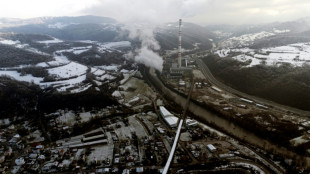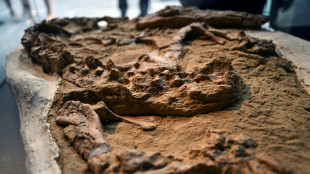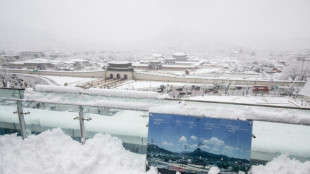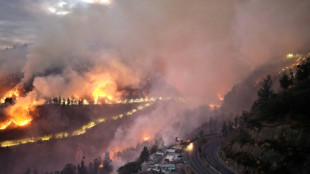
-
 In Bosnia, the path to renewables runs through its coal mines
In Bosnia, the path to renewables runs through its coal mines
-
China probes top military official for corruption

-
 Syria war monitor says more than 130 dead in army-jihadist clashes
Syria war monitor says more than 130 dead in army-jihadist clashes
-
China says top military official Miao Hua under investigation

-
 Taiwan president's plan to stop over in Hawaii, Guam angers Beijing
Taiwan president's plan to stop over in Hawaii, Guam angers Beijing
-
Russian attacks leave one million Ukrainians without power

-
 Markets mixed after subdued pre-holiday shift on Wall St
Markets mixed after subdued pre-holiday shift on Wall St
-
What would an ICC arrest warrant for Myanmar's junta chief mean?

-
 China says top military official Miao Hua suspended, under investigation
China says top military official Miao Hua suspended, under investigation
-
Taiwan's Lai to stop over in Hawaii, Guam during Pacific trip

-
 Namibia extends voting after logistical issues
Namibia extends voting after logistical issues
-
LIV Golf's Herbert in charge at Australian Open, Smith two back

-
 Despair in Sweden as gangs recruit kids as contract killers
Despair in Sweden as gangs recruit kids as contract killers
-
Russia launches massive aerial attack on Ukraine's energy sector

-
 Peru scientists unveil crocodile fossil up to 12 million years old
Peru scientists unveil crocodile fossil up to 12 million years old
-
At plastic treaty talks, no united front for industry

-
 Williamson falls for 93 as England fight back in first Test
Williamson falls for 93 as England fight back in first Test
-
South Korea officials say three dead in heavy snowfall

-
 High-flying Fiorentina face test of Scudetto credentials with Inter visit
High-flying Fiorentina face test of Scudetto credentials with Inter visit
-
Verstappen switches focus to re-boot defence of F1 teams' title

-
 UK filmmaker Richard Curtis makes first foray into animation
UK filmmaker Richard Curtis makes first foray into animation
-
Countrywide air alert in Ukraine due to missile threat

-
 China's military corruption crackdown explained
China's military corruption crackdown explained
-
Primark boss defends practices as budget fashion brand eyes expansion

-
 Williamson eyes ton as New Zealand take control against England
Williamson eyes ton as New Zealand take control against England
-
Norway faces WWF in court over deep sea mining

-
 Trump, Sheinbaum discuss migration in Mexico amid tariff threat
Trump, Sheinbaum discuss migration in Mexico amid tariff threat
-
Asian markets mixed after subdued pre-holiday shift on Wall St

-
 Orban's soft power shines as Hungary hosts Israeli match
Orban's soft power shines as Hungary hosts Israeli match
-
'Retaliate': Trump tariff talk spurs global jitters, preparations

-
 'Anti-woke' Americans hail death of DEI as another domino topples
'Anti-woke' Americans hail death of DEI as another domino topples
-
Trump hails migration talks with Mexico president

-
 Truckers strike accusing Wagner of driver death in Central African Republic
Truckers strike accusing Wagner of driver death in Central African Republic
-
London police say 90 victims identified in new Al-Fayed probe

-
 Air pollution from fires linked to 1.5 million deaths a year
Air pollution from fires linked to 1.5 million deaths a year
-
Latham falls for 47 as New Zealand 104-2 in first England Test

-
 US tells Ukraine to lower conscription age to 18
US tells Ukraine to lower conscription age to 18
-
Judge denies Sean Combs bail: court order

-
 Suarez extends Inter Miami stay with new deal
Suarez extends Inter Miami stay with new deal
-
Perfect Liverpool on top of Champions League, Dortmund also among winners

-
 Liverpool more 'up for it' than beaten Madrid, concedes Bellingham
Liverpool more 'up for it' than beaten Madrid, concedes Bellingham
-
Aston Villa denied late winner against Juventus

-
 Mexico president hails 'excellent' Trump talks after US tariff threat
Mexico president hails 'excellent' Trump talks after US tariff threat
-
Leicester set to appoint Van Nistelrooy - reports

-
 Coffee price heats up on tight Brazil crop fears
Coffee price heats up on tight Brazil crop fears
-
Maeda salvages Celtic draw against Club Brugge

-
 Villa denied late winner against Juventus
Villa denied late winner against Juventus
-
Dortmund beat Zagreb to climb into Champions League top four

-
 Mbappe misses penalty as Liverpool exact revenge on Real Madrid
Mbappe misses penalty as Liverpool exact revenge on Real Madrid
-
Brazil's top court takes on regulation of social media


Japan regulator OKs release of treated Fukushima water
Japan's nuclear regulator on Friday formally approved a plan to release more than a million tonnes of treated water from the crippled Fukushima nuclear power plant into the ocean.
The plan has already been adopted by the government and endorsed by the International Atomic Energy Agency (IAEA), but plant operator TEPCO must still win over local communities before going ahead.
The country's Nuclear Regulation Authority approved TEPCO's plan, according to a foreign ministry statement, which said the government would ensure the safety of the treated water as well as the "reliability and transparency of its handling".
Cooling systems at the plant were overwhelmed by a tsunami triggered by a massive undersea quake on March 11, 2011, causing the worst nuclear accident since Chernobyl.
Decommissioning work is under way and expected to take around four decades, with painstaking efforts to remove molten fuel from damaged reactors among the tasks ahead.
Each day, the site produces 140 cubic metres of contaminated water -- a combination of groundwater, seawater and rainwater that seeps into the area, and water used for cooling.
The water is filtered to remove various radionuclides and moved to storage tanks, with 1.29 million tonnes on site already and space expected to run out in around a year.
TEPCO says the treated water meets national standards for radionuclide levels, except for one element, tritium, which experts say is only harmful to humans in large doses.
It plans to dilute the water to reduce tritium levels and release it offshore over several decades via a kilometre-long underwater pipe.
The IAEA says the release, which will take place over many years and is not expected to begin before spring 2023, meets international standards and "will not cause any harm to the environment".
But local fishing communities that suffered in the wake of the nuclear accident fear consumers will once again shun their products if the water is released in the area.
There has also been criticism from regional neighbours including South Korea and China, as well as groups like Greenpeace.
The 2011 disaster in northeast Japan left around 18,500 people dead or missing, with most killed by the tsunami.
Around 12 percent of the Fukushima region was once declared unsafe, but no-go zones now cover around two percent, although populations in many towns remain far lower than before.
L.Janezki--BTB
